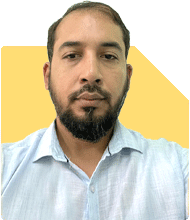Chocko Valliappa |539 Answers |Ask -Follow
Tech Entrepreneur, Educationist - Answered on Jun 06, 2024
A fourth-generation entrepreneur, Valliappa is a member of Confederation of Indian Industry, Nasscom, Entrepreneurs Organization and Young Presidents’ Organization.
He was honoured by the YPO with their Global Social Impact award in 2018.
An alumnus of Christ College, Bangalore, Valliappa holds a degree in textile technology and management from the South India Textile Research Association. His advanced research in the Czech Republic led to the creation of innovative polyester spinning machinery.... more

Hello Sir, I am a 35 yr BE(CSE) Male working in Bangalore with 12.5 yrs experience in Embedded systems domain with not bad salary. I want to switch to my passion which is teaching in a non technical field. Based on my interest, I have come with below options. 1) A computer science / Maths teacher with BEd degree. Do I also require Bsc / Msc course for this ? If so, can I pursue via distance education mode ? 2) A Professor in a BEd College - I am aware that we need BEd, MEd, Phd. Assume I am doing them, do they even welcome a 45 yr fresher for that ? Is work experience as a teacher in schools required for those posts ? 3) A CAT quants coach - with good interest in maths, I want to know what are the institutes / coaching centres looking in such candidates. I have 3-5 years in hand before making switch. Kindly advise what are the efforts, how I may need to prepare for this change.
You may like to see similar questions and answers below
Aasif Ahmed Khan | Answer |Ask -Follow
Tech Career Expert - Answered on Jul 24, 2024
Aasif Ahmed Khan | Answer |Ask -Follow
Tech Career Expert - Answered on Jul 24, 2024
Rajesh Kumar Singh | Answer |Ask -Follow
IIT-JEE, GATE Expert - Answered on Dec 09, 2024
Patrick Dsouza |1428 Answers |Ask -Follow
CAT, XAT, CMAT, CET Expert - Answered on Jan 31, 2025
Dr Dipankar Dutta |1836 Answers |Ask -Follow
Tech Careers and Skill Development Expert - Answered on May 17, 2025
Dr Shyam Jamalabad |107 Answers |Ask -Follow
Dentist - Answered on Dec 05, 2025
Dr Shyam Jamalabad |107 Answers |Ask -Follow
Dentist - Answered on Dec 05, 2025
Dr Dipankar Dutta |1836 Answers |Ask -Follow
Tech Careers and Skill Development Expert - Answered on Dec 05, 2025
Ulhas Joshi |280 Answers |Ask -Follow
Mutual Fund Expert - Answered on Dec 05, 2025
Dr Dipankar Dutta |1836 Answers |Ask -Follow
Tech Careers and Skill Development Expert - Answered on Dec 04, 2025
Ravi Mittal |676 Answers |Ask -Follow
Dating, Relationships Expert - Answered on Dec 04, 2025
Anu Krishna |1745 Answers |Ask -Follow
Relationships Expert, Mind Coach - Answered on Dec 04, 2025
Anu Krishna |1745 Answers |Ask -Follow
Relationships Expert, Mind Coach - Answered on Dec 04, 2025
Mayank Chandel |2562 Answers |Ask -Follow
IIT-JEE, NEET-UG, SAT, CLAT, CA, CS Exam Expert - Answered on Dec 04, 2025
Mayank Chandel |2562 Answers |Ask -Follow
IIT-JEE, NEET-UG, SAT, CLAT, CA, CS Exam Expert - Answered on Dec 04, 2025




























